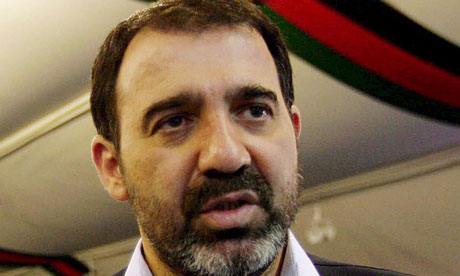Ahmed Wali Karzai killing sparks fears of turmoil in Kandahar
Brother of Afghan president Hamid Karzai shot dead by security guard was seen as keystone of security in the south
- guardian.co.uk,

Ahmed Wali Karzai, brother of the Afghan president, Hamid Karzai, was shot dead in his home by a security guard. Photograph: S Sabawoon/EPA
Ahmed Wali Karzai, the powerful half-brother of the Afghan president, Hamid Karzai, has been killed by one of his security guards inside his house in Kandahar, raising the prospect of turmoil in a city widely seen as the key to the war in Afghanistan.
The president confirmed the death at a press conference in Kabul intended to mark the visit of the French president, Nicolas Sarkozy, to the capital.
"Ahmed Wali Karzai was killed at about 11.30am," General Abdul Razaq, Kandahar's chief of border police, said. "He was killed by his bodyguard inside his house." Officials said the assassin, named as Sardar Mohammed, reportedly Ahmed Wali Karzai's chief of security, had been killed on the spot.
"After Sardar Mohammed killed Ahmed Wali Karzai, other bodyguards shot Sardar Mohammed," Colonel Mohammad Mohsen, of the Afghan national army 205 Atal (Hero) Corps in Kandahar, said.
"The bodies have been taken to the [local] hospital. We expect some officials including President Karzai to come to Kandahar for his brother's funeral."
Razaq said an investigation into the assassination was under way, but according to initial reports from Kandahar, Sardar entered his boss's home and approached him with papers to sign, shooting him at close range with a pistol concealed under the papers.
The Taliban claimed responsibility for the assassination, saying it was one of their "biggest and most successful" operations. However, western officials said it was possible that he could have been killed as part of a settling of scores among tribal leaders or drug traffickers. Ahmed Wali Karzai had frequently been accused by western officials of being a regional kingpin and warlord in the opium trade. He also faced allegations of being on the CIA's payroll. He rejected all the charges, claiming they were made by western forces to cover their own shortcomings.
Ahmed Wali Karzai was a powerful figure in Afghan politics. He had been a member of the provincial council in Kandahar since 2005 and was its chief at the time of his death, although his family, tribal and business contacts gave him influence far beyond his official title.
"He was the president of Kandahar," said provincial elder Abdul Samat Zarih. "The governor, police chiefs and other officials all had to discuss things with him before they made a decision."
Zarih added that Ahmed Wali Karzai had many enemies, including the Taliban. "Maybe the Taliban killed him because he was close to the government. Maybe he didn't obey or follow whatever the foreigners said to him. It's a situation in which you can't figure out what is going on," he said.
Ahmed Wali Karzai was also seen as a keystone of security in the south and his assassination will raise fears about a potential power and security vacuum in the insurgent-ridden region. President Karzai also valued him as a trusted liaison between the government in Kabul and the nation's second-biggest city.
"People are asking what tomorrow will bring," said a senior US official, speaking on condition of anonymity. "Who is capable of replacing Ahmed Wali on the provincial council? As an intermediary between Kabul and Kandahar? Who is going to try and keep at bay the different rivalries bandaged over for the last few years? Who will fill the various holes occupied by AWK? These are all important questions." He added his death was "first and foremost a setback for Afghanistan as a whole".
Other western officials predicted that although there would be "turbulence" in the short term, while a new power structure took shape in Kandahar, in the longer term the absence of Ahmed Wali Karzai as a power broker could provide an opportunity to strengthen legitimate local government.
Ahmed Wali Karzai had been the target of previous assassination attempts. In 2009 four suicide bombers stormed the provincial council office in Kandahar, killing 13 people.
Departing US commander General David Petraeus said the International Security Assistance Force had halted the Taliban's momentum in key areas. However, the Taliban strategy of targeted assassinations in Kandahar province demonstrates its continued ability to strike Isaf and the Afghan government where it hurts.
The Kandahar deputy governor, Abdul Latif Ashna, and provincial police chief, General Mohammad Mojayed, were killed in suicide attacks this year. The Taliban claimed responsibility for both deaths.
The Isaf spokesman, Carsten Jacobson, agreed it was not yet certain the Taliban had carried out the attack. He denied the assassination was a setback for Isaf.
"We must find out how he was killed," Wahid Mujda, a former member of the Taliban turned analyst, said. "We don't know whether it was carried out by a power rival or by the Taliban."
Mujda added the death would have an impact on the government and the progress being made in reconciliation talks with the Taliban. Karzai supported the peace process and had chalked up a few reintegration successes in the province.
Haji Padsha, an elder of the Alikozai tribe in Kandahar province, said Karzai had been shot on his return from a meeting with foreigners at the former house of Mullah Mohammed Omar, the fugitive leader of the Afghan Taliban.
Karzai had come under criticism in the past from Afghans for renting the property to international officials. It was reported in the New York Times in 2009 that he received rent from the CIA and American special operations forces for allowing them to occupy a large compound outside the city that is the former home of Mullah Mohammed Omar. The Kandahar Strike Force, a militia run by the CIA, also shares the compound.


No comments:
Post a Comment